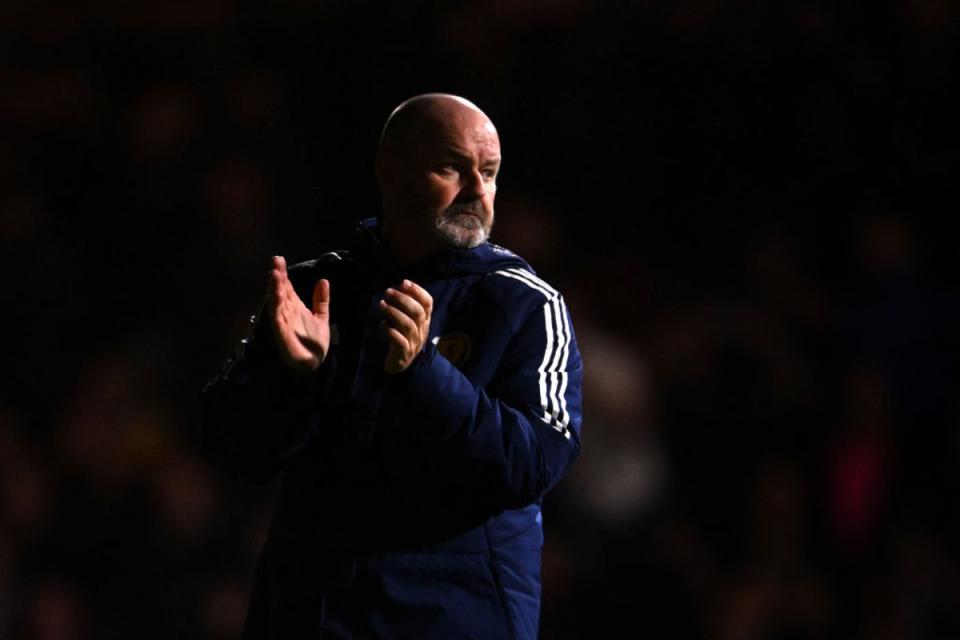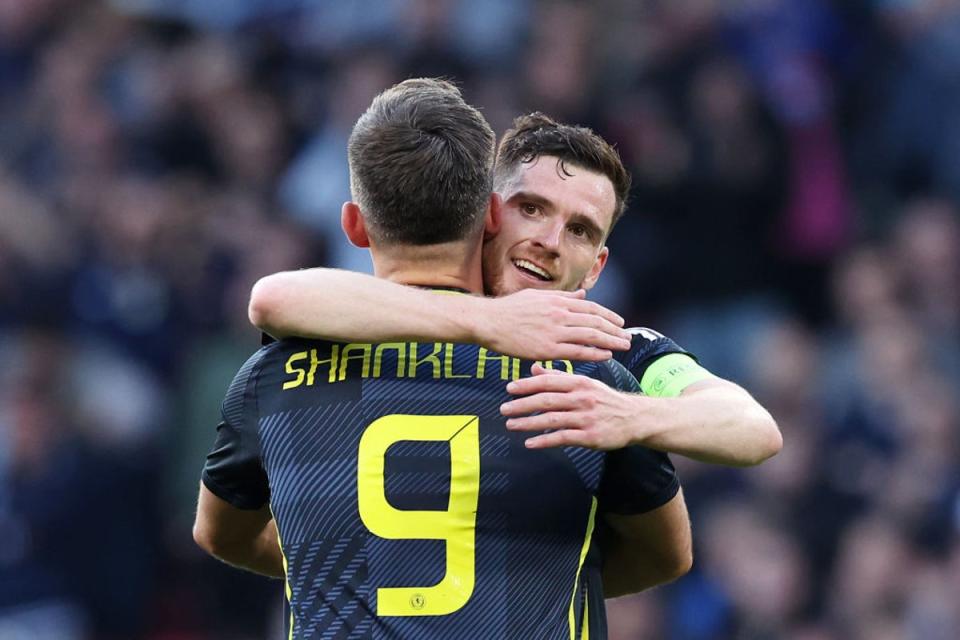Everything is against Scotland at Euro 2024 – except one key factor
Steve Clarke does NOT endorse this article – and that’s fine, we’ll get back to Steve Clarke in a moment. In case you hadn’t heard, Scotland are heading to just a second men’s major international tournament in 26 years. After the subdued, Covid-restricted taste-test of Euro 2020 three years ago, Euro 2024 in Germany is the real deal: the Tartan Army will be back, released onto the continent in their tens of thousands and in full voice, buoyant after a qualification campaign that taught a nation how to dream again. Nothing could possibly lessen the excitement now. Nothing.
Hang on though. Injuries to who? One win since when? Germany are finally themselves again? Steady on. This wasn’t going to be easy, but squeezing past the minnows of Gibraltar in a friendly last week did not suggest Scotland will be going to the Euros on a wave of optimism. Clarke was hardly echoing the hubris of Ally MacLeod in 1978 when the Scotland manager took a pop at “negative Normans” in the press. “What’s there to be negative about? Why not just relax and enjoy it,” he said. “I just don’t understand why anybody would be negative about a second European Championships in a row.”
Clarke is not wrong – but there are, admittedly, some big issues ahead of Friday night’s opener against the hosts. A thin squad has been further depleted, with injuries striking in key positions where there are shortages of replacements. Right-backs Aaron Hickey and Nathan Patterson, and Italy’s midfielder of the year Lewis Ferguson, were already ruled out before Lyndon Dykes, the battering-ram forward who had played a vital part in Scotland’s recent success, suffered an ankle ligament injury in training. Euro 2024 can simultaneously feel like the tournament Scotland have waited a generation for, while also arriving at just the wrong time for this squad.
But enough: Scotland and Clarke have achieved too much already to be written off so dismissively and before a ball is kicked. After all, this is the team who defied the odds in qualifying, who brought back the Hampden roar after stunning Spain, and are responsible for the absence of Erling Haaland and Martin Odegaard in Germany with that late Oslo comeback. A run of five consecutive victories to open Euro 2024 qualifying was testament to what Scotland had been building under Clarke since he took charge in 2019: a club-like environment that has fostered a sense of unity and spirit.
There is no special formula, only the organisation and commitment of the overall group. “It’s just down to your everyday basics,” the midfielder Callum McGregor explained. “The manager has a really good system where the players believe in it.” None of that has to change now, despite the key absences. Compared to other nations, Scotland may be short of potential match-winners but they have characters and cohesion. Andy Robertson, John McGinn and Scott McTominay can provide moments of inspiration. Collectively, Scotland will benefit from their experience of Euro 2020, even if they only collected one point and suffered the disappointment of a group-stage exit.
The feeling after Scotland deservedly qualified for Euro 2024 was Clarke’s side could build on that tournament, especially as the Group A draw the Tartan Army received appears slightly more favourable than three years ago. While Germany are favourites, it is set to be a close fight between Scotland, Hungary and Switzerland for second and third. The format works in Scotland’s favour but the same applies to their Group A opponents. Hungary, with recent wins over England and Germany behind them, are being tipped by some as dark horses. Switzerland have experience to call upon, reaching the knockout stages in five consecutive major tournaments. Both have more star quality than Scotland but one win may be enough. Clarke is targeting four points.

And yet one win, against Gibraltar, the second-lowest ranked team in Europe, is all Scotland have managed since qualifying for the Euros. A loss of form and a seven-game winless run following their qualification can be attributed in part to facing England, Spain, France and the Netherlands, the latter three all away from home. Clarke’s side had competitive spells in fixtures where performances against some of Europe’s heavyweights were more important than results. It would be less of a worry if Scotland were at full strength but, within that, there is a wider trend that may be more of a concern.
Scotland will need to be resolute and resilient when they face hosts Germany on Friday night but recent form suggests they have become susceptible to lapses in concentration. A defence that only conceded to an Erling Haaland penalty in their first five games of qualifying has become considerably leakier since Phil Foden and Jude Bellingham scored twice in three minutes last September. In subsequent defeats, Scotland conceded two in 13 minutes against Spain, three in 35 against France, and three in 14 against the Netherlands. It struck again against Finland last week. Scotland were heading for a morale-boosting send-off before the visitors snatched two late goals in 13 minutes to salvage a 2-2 draw.

Scoring goals could be an even starker issue, however. Che Adams has only averaged a goal every five appearances for Scotland and his opener against Gibraltar was his first in almost two years. Lawrence Shankland has just three international goals to his name but the Scottish player of the year could start in Munich in place of the injured Dykes. McGinn and McTominay remain Scotland’s biggest threats from midfield, with Bristol City forward Tommy Conway and New York Red Bulls winger Lewis Morgan, both drafted in as injury replacements, completely untested as attacking options. It is a theme: Anthony Ralston is expected to be given the nod at right wing-back, after a season where the 25-year-old was second-choice and made just six starts for Celtic.
Clarke, though, has never grumbled or complained about the hand he has been dealt, and in many ways the 60-year-old remains the key to what Scotland are attempting to achieve. Clarke has become the unlikely face of Scotland’s resurgence, the man who speaks exclusively in low, gentle tones sending the Tartan Army off to Germany for their biggest party in a generation. He is right to pour scorn on the negativity. There is hope still as tens of thousands arrive in Munich ahead of the opener, even as Scotland head into Euro 2024 lacking anything and everything they may need to progress: wins, goals, clean sheets and right-backs among them. But Clarke has worked wonders for this team, Scotland have been building to this. He believes – and that may just be enough for everyone else as well.

